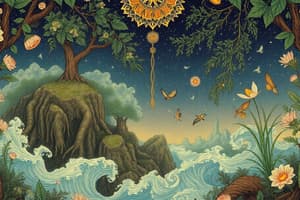Podcast
Questions and Answers
Which components are essential for an ecosystem?
Which components are essential for an ecosystem?
- Only the abiotic components
- Both biotic and abiotic components (correct)
- Only the biotic components
- Only physical relationships between species
What is a primary factor that affects the living species within an ecosystem?
What is a primary factor that affects the living species within an ecosystem?
- The abiotic conditions (correct)
- The geographical layout only
- The number of species alone
- The presence of artificial elements
What happens to living organisms if the temperature of their ecosystem decreases?
What happens to living organisms if the temperature of their ecosystem decreases?
- They migrate to a different ecosystem without adjustments
- They thrive without any change
- They must adapt to the new temperature (correct)
- They become independent of their environment
Ecosystems can be categorized as?
Ecosystems can be categorized as?
Which of the following best describes the interdependence within an ecosystem?
Which of the following best describes the interdependence within an ecosystem?
What is the primary characteristic of the Earth system based on its interactions?
What is the primary characteristic of the Earth system based on its interactions?
What are the two main components of the lithosphere?
What are the two main components of the lithosphere?
What can be said about the rates of processes in the Earth system?
What can be said about the rates of processes in the Earth system?
How thick is Earth's crust approximately?
How thick is Earth's crust approximately?
What lies beneath the Earth's crust in the lithosphere?
What lies beneath the Earth's crust in the lithosphere?
What is a consequence of the consumption of non-replenishable resources?
What is a consequence of the consumption of non-replenishable resources?
Which of the following is NOT considered part of the built environment?
Which of the following is NOT considered part of the built environment?
How do humans create components of the built environment?
How do humans create components of the built environment?
Which of the following factors contributes to harmful changes in local habitats?
Which of the following factors contributes to harmful changes in local habitats?
What type of resources are at risk due to unsustainable consumption practices?
What type of resources are at risk due to unsustainable consumption practices?
What is a primary reason for creating products from natural resources?
What is a primary reason for creating products from natural resources?
What is likely to be a consequence of deforestation?
What is likely to be a consequence of deforestation?
Which of the following materials is produced through skill and technology from natural resources?
Which of the following materials is produced through skill and technology from natural resources?
What is the formula for calculating energy?
What is the formula for calculating energy?
What role do photovoltaic cells play in solar panels?
What role do photovoltaic cells play in solar panels?
What is necessary to convert direct current (DC) to alternating current (AC)?
What is necessary to convert direct current (DC) to alternating current (AC)?
How is energy from sunlight primarily stored by natural processes?
How is energy from sunlight primarily stored by natural processes?
Which small particles are involved in the production of electricity in photovoltaic cells?
Which small particles are involved in the production of electricity in photovoltaic cells?
What component of a solar energy system is used to capture sunlight for thermal energy?
What component of a solar energy system is used to capture sunlight for thermal energy?
Which of the following statements about solar energy is false?
Which of the following statements about solar energy is false?
What is a major limitation of direct current (DC) produced from solar panels?
What is a major limitation of direct current (DC) produced from solar panels?
How are natural resources categorized based on their origin?
How are natural resources categorized based on their origin?
What characterizes a potential resource?
What characterizes a potential resource?
Which of the following resources is classified as a non-renewable resource?
Which of the following resources is classified as a non-renewable resource?
What is primary energy?
What is primary energy?
What distinguishes actual resources from stock resources?
What distinguishes actual resources from stock resources?
How is energy primarily defined?
How is energy primarily defined?
Which statement about fossil fuels is correct?
Which statement about fossil fuels is correct?
What is an example of a reserve resource?
What is an example of a reserve resource?
Flashcards are hidden until you start studying
Study Notes
Ecosystems
- An ecosystem is a group of living (biotic) and non-living (abiotic) things that interact with each other.
- Ecosystems can be naturally occurring or human-made.
- Biotic and abiotic components of an ecosystem affect each other.
- An example of this interaction is the impact of global warming on an ecosystem.
Types of Systems
- The Earth system is a closed system where materials cycle between the lithosphere, atmosphere, hydrosphere, and biosphere.
- Changes in one part of the Earth system affect the others.
- Earth's processes occur at different rates, some are very fast, others very slow.
Lithosphere
- The lithosphere is the rigid outer layer of Earth, composed of the crust and upper mantle.
- The crust has a thickness of around 5-30 kilometers.
- The upper mantle is beneath the crust and is also solid, rigid, and relatively cool.
Natural and Built Environment
- Humans utilize skills and technology to transform natural resources into products that fulfill their needs.
- Examples include using iron ore to produce steel and lime, silica, alumina and iron compounds to create concrete.
- Many interactions between the built and natural environments have detrimental effects, including:
- Consumption of non-renewable resources like fossil fuels.
- Consumption of resources without replenishment, such as hardwood forests.
- Harmful changes to local habitats due to activities like deforestation.
- Harmful changes to global habitats, leading to climate change.
Categorizing Natural Resources
- Resources can be categorized based on their source, stage of development, and renewability.
- Based on source, resources are classified as biotic (living) or abiotic (nonliving).
- According to stage of development, resources are categorized as:
- Potential resources (e.g., oil reserves)
- Actual resources (quantified and qualified)
- Reserve resources (potentially extractable in the future)
- Stock resources (lacking the technology for extraction).
Energy
- Energy is defined as the ability of an object or system to do work.
- Energy exists in various forms, including heat, light, sound, motion, and electricity.
- The sun is the primary source of energy for Earth, driving weather systems and warming oceans.
- Fossil fuels were formed from the decomposition of prehistoric organisms over geological time.
- Primary energy refers to the total energy contained in natural reserves or primary fuel flows (e.g., coal, oil, gas).
Solar Energy
- Solar panels consist of photovoltaic (PV) cells that convert sunlight into electricity.
- PV cells are made of silicon atoms that lose an electron when struck by sunlight.
- Sunlight consists of photons, which knock electrons off silicon atoms in PV cells, generating direct current (DC).
- Inverters are used to convert DC electricity to alternating current (AC), suitable for household appliances.
Solar Thermal Energy
- Solar thermal technology uses solar collectors to capture solar radiation for energy.
Studying That Suits You
Use AI to generate personalized quizzes and flashcards to suit your learning preferences.





